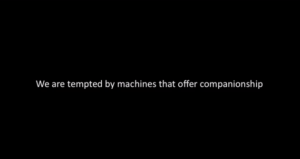I was struck by this frame while watching Sherry Turkle’s video, Connected, but alone?. Perhaps it was simply the technopunk poetics of the word choice (I feel that this phrase could spawn a novel or two), but something about it caught in my mind.
I was caught off guard when Stephen Colbert asked me a profound question .. he said, “don’t all those little tweets, don’t all those little sips of online communications add up to one big gulp of real conversation?”
My answer was no, they don’t add up. Connecting in sips, connecting in sips may work for gathering discrete bits of information, they may work for saying, “I’m thinking about you”, or even for saying, “I love you.” … But they don’t really work for learning about each other, for really coming to know and understand each other. And we use conversations with each other to learn how to have conversations with ourselves. So a flight from conversation can really matter, because it can compromise our capacity for self reflection. For kids growing up, that skill is the bedrock of development. Over and over I hear, I would rather text than talk, and what I’m seeing is that people get so used to getting short changed to out of real conversation. So used to getting by with less, that they become almost willing to dispense with people altogether.
Dr. Rosen came to similar results – although I can’t find them publicly available for linking – about preferred modes of communication with “a close friend”:
| Group | Most Preferred | Less Preferred | Even Less Preferred |
|---|---|---|---|
| Older People | Face-to-face | Phone | |
| Young Adults | Face-to-face | Texting | Phone |
| Kids These Days | Texting | Email/Im/Phone | Face-to-face |
Face-to-face drops to fifth place in terms of how young kids (defined as Rosen as those born in the 2000s, or so) communicate. So, are we tempted by these machines that offer companionship in place of real communication? Definitely. Is this a bad thing? Nobody is sure, but it’s looking like it. Depressed people chat more online. While correlation does not equal causation, those who use the internet more can become depressed. If both of these are true, we have a kind of negative spiral for anyone with an internet connection and a deep feeling of sadness.
Texts are far easier than actually having to talk to someone, especially because they work across enormous distances. I can see how a generation used to instant gratification would love to be able to have instant communication with anyone anywhere. They’re also incredibly private, so you don’t risk someone overhearing, even if they’re in the same room as you.
I don’t actually have a point about any of this right now, I just think it’s interesting.

Leave a Reply